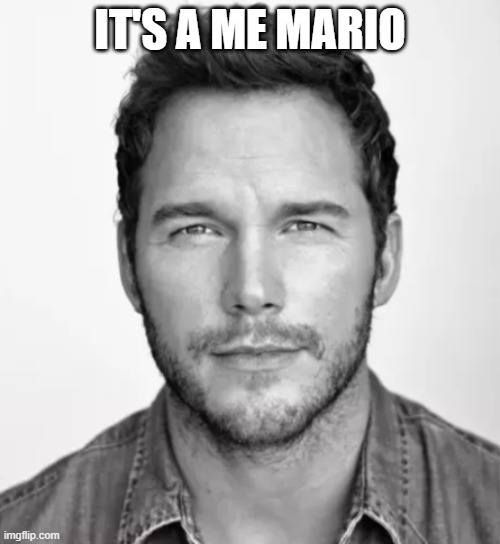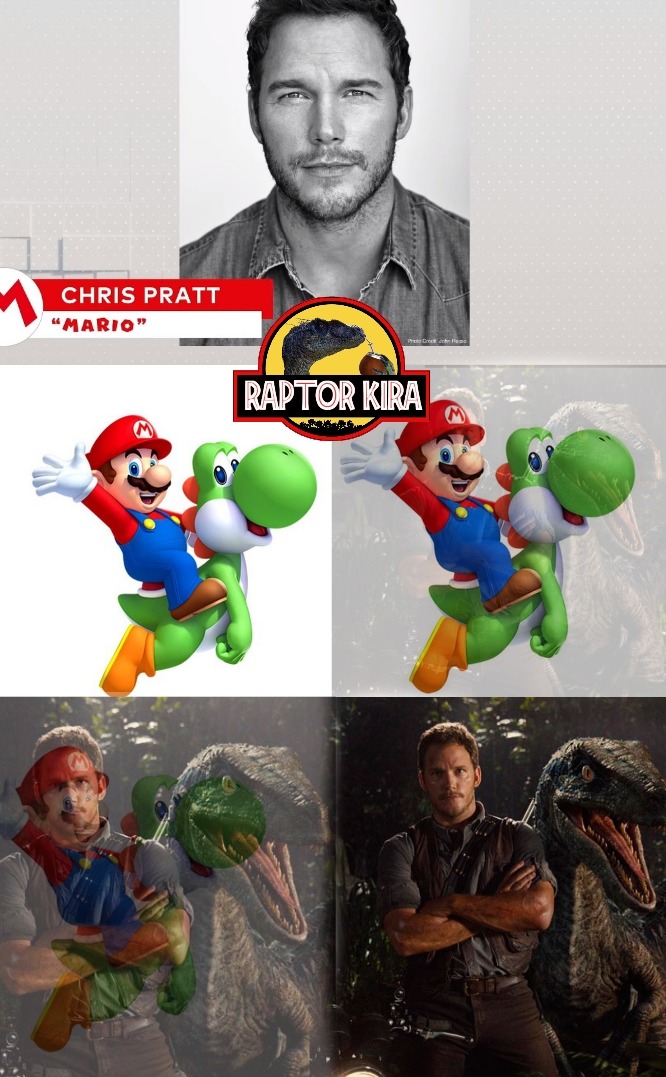Chris Pratt Mario Meme: You Won't Believe This!
Is the internet's obsession with Chris Pratt's casting as Mario truly as dire as some make it out to be? The enduring "chris pratt mario meme" phenomenon underscores a fascinating interplay of audience expectation, creative choices, and the relentless churn of internet culture, a perfect storm of fan opinion and media critique.
The announcement that Chris Pratt, a seasoned actor known for his roles in blockbuster franchises, would lend his voice to the iconic video game character Mario in the animated film adaptation sent ripples through the online community. It wasn't just the choice of actor, but the character he was chosen to portray, that ignited the fiery debate. Mario, a figure intrinsically linked to the history of video games, carries immense cultural weight. For generations, he has been a symbol of playful adventure, determined heroism, and unwavering optimism. To cast someone like Pratt, known for his distinctly comedic and, at times, self-deprecating persona, raised immediate questions. Would he capture the essence of Mario? Would his performance resonate with the character's established fan base? The questions, and the associated memes, quickly took center stage, reflecting the power of internet opinion.
The "chris pratt mario meme" saga illustrates a larger phenomenon: the way in which fans react to casting decisions, especially when beloved characters are involved. Its a microcosm of the challenges faced by studios in balancing creative ambition with the weight of audience expectations. A poor casting decision can quickly trigger a cascade of criticism. The internet, armed with an endless supply of creative tools and a global reach, becomes a powerful platform for both expressing excitement and broadcasting displeasure. Memes, in particular, quickly become a dominant mode of communication. The speed at which a meme can spread is breathtaking; the speed at which it can be created, and adapted to various situations is even more fascinating. In this case, the "chris pratt mario meme" has, in its very existence, become part of the films marketing, and a key indicator of its cultural reach.
The evolution of the "chris pratt mario meme" is a study in contrasts. Initially, the memes tended to be humorous critiques imagining Pratts voice, juxtaposing Marios image with other Pratt characters, or simply expressing bewilderment at the choice. However, as the films release neared, the tone of the memes began to shift. Some memes took on a more optimistic outlook, using Pratt's casting as a point of discussion and conversation. Trailers and teasers were quickly analyzed, and the memes evolved to incorporate footage and screenshots. Others leaned into the absurd, producing parodies and imaginative scenarios. Ultimately, the very proliferation of the memes proves the character's impact.
The debate surrounding Chris Pratts portrayal of Mario is, on one level, about the character of Mario himself. Mario, from his humble origins in the arcade game "Donkey Kong," has evolved into one of the most recognizable characters in entertainment history. He's more than just a video game icon; he's a cultural cornerstone. His image is instantly recognizable across age groups and across international borders. The character has transformed from a simple, pixelated figure into a multimedia superstar, capable of headlining movies, television shows, and countless other products. The "chris pratt mario meme" speaks to the fact that, for many fans, any adaptation must honor this legacy. The success or failure of the film adaptation, therefore, rests not just on the technical aspects of the film, but on the nuanced understanding and faithful translation of this legacy.
The decision to cast Chris Pratt, and the subsequent reaction, serves as a case study in the perils and possibilities of adapting popular media for a modern audience. The internet is no longer a passive observer; it is an active participant. Fans have the power to voice their opinions, create content, and influence the discussion. This can be a powerful force for good, driving creators to do their best work. The pressure is immense. Studios must find a way to listen to fan feedback while still maintaining the creative freedom to realize their vision. The evolution of the "chris pratt mario meme" reflects the tension between these competing forces, demonstrating the complex relationship between the creative industries and the audience that consumes their products.
Ultimately, the impact of the "chris pratt mario meme" extends far beyond the humorous images and the online debates. It reflects a fundamental shift in how we consume and interact with media. The internet has democratized the creative process, allowing fans to become active participants in the conversation. The studios, in turn, have had to adapt to a world where their every move is subject to scrutiny. The success of this adaptation will hinge on the ability to understand and, ultimately, respect the power of the "chris pratt mario meme."
The meme is not merely a joke; it is a marker of cultural engagement, a signal of the enduring relevance of Mario in the zeitgeist. It's a reminder that in the age of social media, every casting decision is a referendum, and every adaptation is a high-stakes test of legacy and innovation. The question of whether Pratt's portrayal of Mario will be a success is, perhaps, beside the point. The real story is how the "chris pratt mario meme," from its initial viral explosion to its ongoing evolution, has become an undeniable part of the cultural landscape and a testament to the power of internet culture.
Let's delve deeper into the actor at the heart of this meme and the impact of his career:
| Category | Information |
|---|---|
| Full Name | Christopher Michael Pratt |
| Born | June 21, 1979 (age 44 years) |
| Birthplace | Virginia, Minnesota, U.S. |
| Nationality | American |
| Height | 6 ft 2 in (1.88 m) |
| Spouse(s) | Anna Faris (m. 20092018), Katherine Schwarzenegger (m. 2019present) |
| Children | 3 |
| Career Highlights | Known for roles in Parks and Recreation, Guardians of the Galaxy, and Jurassic World. |
| Notable Awards | MTV Movie Award, Teen Choice Award |
| Net Worth (Estimated) | $80 Million |
| Additional Info | Pratt worked as a waiter before his acting career began. He was discovered while waiting tables. |
| Link to Authentic Website | IMDB - Chris Pratt |
Beyond the immediate buzz surrounding the casting of Chris Pratt, the "chris pratt mario meme" reflects the broader dynamics of fandom, the interplay between entertainment and the internet. It speaks of the nature of entertainment in the 21st century.
The evolution of Mario, from a simple video game sprite to a pop culture phenomenon, is a testament to the power of creative storytelling and the impact of technological advancement. His journey has been marked by constant evolution, adaptation, and reinvention. The "chris pratt mario meme" reflects this ongoing transformation. The memes themselves evolved, becoming a complex reflection of the anticipation surrounding the animated film.
It is important to remember that the creation and proliferation of memes are not random. They are driven by cultural forces, by a deep understanding of the characters, and of the context. The "chris pratt mario meme" would not have resonated if it were not based on an existing understanding of Marios character and the actor cast in the role. It's a reminder that even in the digital age, the success of any creative endeavor hinges on human connection.
Consider the various other animated film adaptations of beloved characters: The casting of voice actors is often the subject of great anticipation. When the character is as well-loved as Mario, the stakes are raised significantly. The fact that the internet can react in real-time, creating memes, parodies, and fan art in response to even the smallest details of the casting process, reflects the changing nature of audience engagement. It also reflects how popular culture can be a powerful force.
Moreover, the "chris pratt mario meme" is part of the ongoing cultural shift, the blurring lines between creative content and its audience. In the past, information flowed primarily from creators to the audience. The internet has transformed this. Audience can actively shape the narrative. They provide the creative, sometimes humorous critique, which, in turn, shapes how we understand the media.
In considering the lasting impact, its important to look at the movie itself. The "chris pratt mario meme" is a reflection of something larger. It reflects a complex relationship between creators and the audience, a relationship that is constantly evolving.
The "chris pratt mario meme" is a mirror reflecting the ongoing evolution of the entertainment industry. The internet is not just a platform for promotion and marketing; it is an integral part of the creative process, and the audience is actively shaping the conversation. Ultimately, the lasting legacy will not simply be the film's success or failure, but the story of a beloved character, the actor who brought him to life, and the memes that defined the conversation.
The "chris pratt mario meme," then, serves as a perfect illustration of the digital age. It's a reminder that in the age of social media, every creative choice is a referendum, and every adaptation of beloved content is a high-stakes test of legacy and innovation. The success of the film is, perhaps, secondary to the meme itself; the meme has already entered the cultural landscape.


